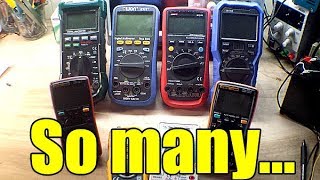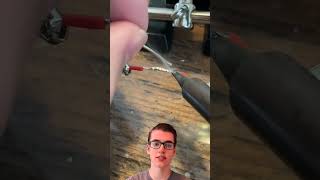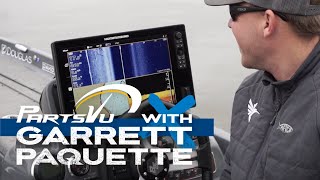
How to choose a multimeter for electronics use
 How to choose a multimeter for electronics use
How to choose a multimeter for electronics use
If you are shopping for electronic components, test gear or consumables please consider visiting my Amazon shop @ https://www.amazon.com/shop/learnelectronics.
Please check out www.patreon.com/learnelectronics and pledge a dollar if you can. It will go a long way to keeping the channel alive. It costs a bit of money to buy all the items and produce these videos. You help is appriciated.
Or….if you’d like to send a one-time donation you can use this link: paypal.me/learnelectronics
FAQ:
Me: Paul, 49 from USA
Education: United States Navy, University of California at San Diego B.S. E.E., University of Pittsburgh M.S. E.E.
Experience: United States Navy STS, Bayer Intnl Process Engineer, C.C.A.C AP of EE
Current: Retired
Health: BAD (Congestive Heart Failure)
Hobbies: Electronics, flying, amateur radio, music (classic rock)
Low cost, professional PCB’s: www.pcbway.com



Thanks
Are you chewing on something ? Sounds like it, rude…
well done
What about safety? True to advertised fuse ratings and such?
do any of those test continuity ?
I’ll look this up myself, but as a suggestion, I would describe what each capability is. I have no idea what "counts" are, or why having more is a good thing. Other than that, great video!
How is this a proper review without any actual testing for the accuracy of the basic functions V, A, Ω?
The main feature on the long run is Reliability and there is where the money are to be spent.
So you chose ones without testing. Bravo.
Not clear the model of the Mastech
Can I trust aneng? Cause that is what I can only afford and the product is from China
For me, I will choose a multimeter with NCV and Temperature detector, and there is it I’ve got a NEWSTAR UT-2032
Love your channel. I’m now 51 and although always wanted to get into electronics, never did. I have a very old rs-components (fluke 8022B) multimeter I inherited from my late father. Now I’m middles aged and have “old things” that need repair I’ve decided to teach myself the basics. Your videos are amazing. Thank you. I have the an-eng on my want list along with a power supply. Once I have those I’m going to start building circuits and playing about.
Thanks for the inspiration 🙂
Hi. Aren’t those holes for the transistor important for testing them? Do those make it easier to test transistors?
Great video, thanks for an honest review. The one video I watched from EEv, I forget what it was he was reviewing, but he got a unit designed for US 120v, some how managed to plug it in to full AUS 240v, and was actually insulted the manufacturer didn’t bend over backwards for him after he deliberately fried their unit. That turned me off from ever going back there again. Not for any kind of product review anyways.
I have the white ugly one, haha 🙂
Pretty crapy but enough for me.
Really helpful video, thanks a lot 🙂
There certainly are a lot of people that are working on vacuum tube guitar amps!
Hello! Best digital multimeter video I’ve seen yet. Stupid question – is there one that also can show if the sine wave output is pure? If not do you know what that device is called? It shows a picture of the wave. Subbed
I ended up with a Bryman 869s as I wanted to cover audio tube amps (1000V CATIV), 0-100KHz to 0.01mV (50K or 500K count), resistance, capacitance and current. Also TrueRMS. I have two low cost meters I’ve used for over ten years but I was weary of using them on 640Vdc between rails and for house mains testing (the 869s seemed. todo well in tests at 5KV transients and with mods was happy with 14KV transients). I agree the best multi meter is the one you reach for. I have a small low cost one that has done me proud but maxes out at 300V and doesn’t have capacitance testing. Thermocouple is useful for testing temps (it will take two) but for hand held accuracy and resolution it’s hard to beat.
Aneng multimeters are good and affordable for students. I had a sub 10$ one from Aliexpress that carried me through university. It was missing capacitance, frequency and microamps measuring, but it had everything else that is essential and hFE measuring which I noticed is missing from some more expensive meters.
Now waiting for my Habotest HT118A to arrive, triple the price of the old one, but with more features and being more modern.
I still use vacuum tubes. Built 3 Fender clones in past 2 years.
Any modern meter will be accurate enough for government work 😉
Even if you are a professional, you don´t need a Fluke unless you are doing laboratory work, and even then, you would probably need something better than a Fluke. I have been servicing medical equipment (CT-MR) for the last 30 years and never really needed a Fluke, though one of the companies I worked for provided me with one during that time (cheap Fluke version though). Save your money and get a nice and good meter from some other brand. Even Fluke manufactures many of their meters in China today, so made in china is not a reason to reject any other MM. Base your decision on reviews.
5 years later and still a good guide. Thanks
Crocodile Dave did say that those cheap meters have there place and they are good for battery operated circuits. I have a cheap multi-meter and it works good for what I use. The thing is for power mains one is going to want a more expensive multi-meter.
What I need to know first is what accuracy the multimeter measures. Then even a device with a scale of 6000 gives much better and more accurate results than a meter of 10000. Accuracy is a basic parameter!
Cool, what’s a good range for the resistor, capacitance and current for repairing monitors, video game consoles and PC and Mac motherboards, Wacom drawing tablet, GPUs and power supplies?
Thank you.
God bless, Rev. 21:4
How about transistor test ?
Os there a mash up of the 2008 and 2009 meters so you have both square wave gen and a bsckloght?
but you still end up owing more than one of these.
thank you. I’m teaching myself how to test chips etc on motherboards and troubleshooting a power issue on an old PS3. So I’m learning about what i need or want in these tools before i buy. idk i might start this as a side hustle for pocket change, fixing electronics is fun to me. I know absolutely nothing about them. how you went through this video and explained while not over explaining, is much appreciated. This confirmed that ~$50 is basically mostly what you need, while ~$20 has enough for general needs. I already see some other videos of yours im going to watch next. Thanks again!!
Are the leads sold separately on some of these multi meters?
these cheap chinese multimeters are a dream come true for all us beginners and they have fulfilled our fantasies of owning different kinds of cool multimeters. instead of buy those expensive meters make a hole in our pockets. my first multimeter UNI-T and my second ANENG 8009 just love it. gonna buy another one even better.
Moistness? Masstech it is!
Fluke meter. Just spend the money once
Your are my hero today!
Thanks for making the video I was confused now my confusion cleared. this video helped me out to pick the best multimeter.
Thanks Paul I was pretty confused . Wanted to buy a cheap one but bit reluctant you solved my problem . thanks !!!
Speaking of gravy. Eating while electronicsing is not recommended. Surprisingly it turns out that multimeters don’t react all that favourably to being dipped in gravy.
Hi Paul, I looked in your videos list and I don’t see any Analog Multimeter review or suggestion. Could you make a video on the best overall Analog Multimeter. I would appreciate that. There is something I like about the analog multimiter.
Very helpful video. It would be great if it gets updated. Thank you sir
😀👍🏿Good Stuff,GreatTips
Straight shooting analysis good job…..getting hard to find honest reviews on the web
I have the anang with buttons instead of a wheel and it’s slow and the auto power off is annoying as hell.
Cheers mate! I was looking for a video that would break down what DMM I need as someone who’s new to electronics. Great stuff.
I think for home use Klein makes the best ones .i love my Klein MM700 .For work I use The Fluke 87V
For stuff that doesn’t matter we have tons of choices. For things that matter we have very limited choices
One of the quikest guides to sort through multimeters for what an individual needs the new meter to do!
I am going to buy the UT61E due that have the data logger link with PC.